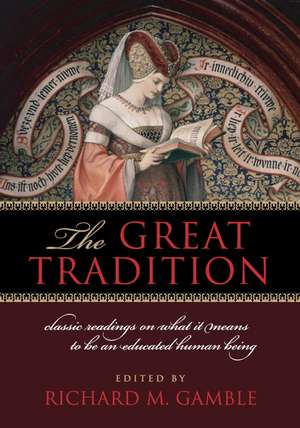The Great Tradition: Classic Readings on What It Means to Be an Educated Human Being
Editat de Richard Gambleen Limba Engleză Paperback – 14 ian 2009 – vârsta ani
Frustrated
with
the
continuing
educational
crisis
of
our
time,
concerned
parents,
teachers,
and
students
sense
that
true
reform
requires
more
than
innovative
classroom
technology,
standardized
tests,
or
skills
training.
An
older
tradition—the
Great
Tradition—of
education
in
the
West
is
waiting
to
be
heard.
Since
antiquity,
the
Great
Tradition
has
defined
education
first
and
foremost
as
the
hard
work
of
rightly
ordering
the
human
soul,
helping
it
to
love
what
it
ought
to
love,
and
helping
it
to
know
itself
and
its
maker.
In
the
classical
and
Christian
tradition,
the
formation
of
the
soul
in
wisdom,
virtue,
and
eloquence
took
precedence
over
all
else,
including
instrumental
training
aimed
at
the
inculcation
of
"useful"
knowledge.
Edited by historian Richard Gamble, this anthology reconstructs a centuries-long conversation about the goals, conditions, and ultimate value of true education. Spanning more than two millennia, from the ancient Greeks to contemporary writers, it includes substantial excerpts from more than sixty seminal writings on education. Represented here are the wisdom and insight of such figures as Xenophon, Plato, Aristotle, Seneca, Cicero, Basil, Augustine, Hugh of St. Victor, Bonaventure, Thomas Aquinas, Martin Luther, John Calvin, Erasmus, Edmund Burke, John Henry Newman, Thomas Arnold, Albert Jay Nock, Dorothy Sayers, C. S. Lewis, and Eric Voegelin.
In an unbroken chain of giving and receiving,The Great Traditionembraced the accumulated wisdom of the past and understood education as the initiation of students into a body of truth. This unique collection is designed to help parents, students, and teachers reconnect with this noble legacy, to articulate a coherent defense of the liberal arts tradition, and to do battle with the modern utilitarians and vocationalists who dominate educational theory and practice.
Edited by historian Richard Gamble, this anthology reconstructs a centuries-long conversation about the goals, conditions, and ultimate value of true education. Spanning more than two millennia, from the ancient Greeks to contemporary writers, it includes substantial excerpts from more than sixty seminal writings on education. Represented here are the wisdom and insight of such figures as Xenophon, Plato, Aristotle, Seneca, Cicero, Basil, Augustine, Hugh of St. Victor, Bonaventure, Thomas Aquinas, Martin Luther, John Calvin, Erasmus, Edmund Burke, John Henry Newman, Thomas Arnold, Albert Jay Nock, Dorothy Sayers, C. S. Lewis, and Eric Voegelin.
In an unbroken chain of giving and receiving,The Great Traditionembraced the accumulated wisdom of the past and understood education as the initiation of students into a body of truth. This unique collection is designed to help parents, students, and teachers reconnect with this noble legacy, to articulate a coherent defense of the liberal arts tradition, and to do battle with the modern utilitarians and vocationalists who dominate educational theory and practice.
Preț: 159.21 lei
Nou
Puncte Express: 239
Preț estimativ în valută:
30.46€ • 31.89$ • 25.21£
30.46€ • 31.89$ • 25.21£
Carte indisponibilă temporar
Doresc să fiu notificat când acest titlu va fi disponibil:
Se trimite...
Preluare comenzi: 021 569.72.76
Specificații
ISBN-13: 9781935191568
ISBN-10: 193519156X
Pagini: 690
Dimensiuni: 178 x 254 x 38 mm
Greutate: 1.2 kg
Ediția:2nd Edition
Editura: ISI Books
Colecția Intercollegiate Studies Institute
ISBN-10: 193519156X
Pagini: 690
Dimensiuni: 178 x 254 x 38 mm
Greutate: 1.2 kg
Ediția:2nd Edition
Editura: ISI Books
Colecția Intercollegiate Studies Institute
Recenzii
"The
Great
Tradition
provides
a
treasury
of
insights
into
Western
education
that
no
school
leadership
can
afford
to
ignore.
Something
will
speak
to
everybody
with
a
mildly
curious
mind:
headmasters
who
want
help
with
the
curriculum
(Quintilian),
parents
who
want
to
raise
wise
and
virtuous
children
(Chrysostom),
lovers
of
the
classics
(Philip
Melanchthon),
students
setting
life
goals
(Basil
The
Great),
teachers
who
want
help
focusing
their
efforts
(Aristotle),
the
historically
curious
(from
Plato
to
C.
S.
Lewis),
and
board
members
setting
priorities
(Paul
Elmer
More).
Every
now
and
then
someone
does
the
world
the
invaluable
favor
of
reminding
us
how
we
got
here
and
what
we’ve
left
behind.
Richard
M.
Gamble
has
done
so
for
a
new
generation."
—Andrew Kern, President, CiRCE Institute, and coauthor ofClassical Education, The Movement Sweeping America
—Andrew Kern, President, CiRCE Institute, and coauthor ofClassical Education, The Movement Sweeping America
"An
impressive
new
volume
of
selected
readings
which
trace
the
thread
of
education
as
it
is
woven
into
our
cultural
fabric,
spanning
more
than
2,000
years,
from
the
ancient
Greeks
to
contemporary
writers....Gamble
has
delivered
a
rich
resource
for
families,
teachers
and
schools
—yes,
even
public
schools,
if
they
would
use
it.
Home
educators
are
certain
to
find
it
an
invaluable
addition
to
their
library."
—Randall Murphree, American Family Association
—Randall Murphree, American Family Association
"Masterfully
edited
by
Gamble,
[this]
is
a
unique
anthology
best
described
in
the
term
given
by
Mortimer
Adler
years
ago--conversation…
'Anticipating
the
objections
of
critics
who
allege
that
the
classical
and
Christian
traditions
are
not
useful
in
the
modern
world,
Gamble
declares,
The
Great
Tradition,
in
contrast,
anchored
in
the
classical
and
Christian
humanism
of
liberal
education,
has
taken
the
broader
view
that
what
is
useful
is
that
which
helps
men
and
women
to
flourish
in
nonmaterial
ways
as
well--in
other
words,
that
which
helps
them
to
be
happy…'
If
there
is
any
hope
for
an
educational
Renaissance,
especially
within
the
liberal
arts,
it
will
have
to
occur
with
a
sense
of
the
authentic
and
primarily
formative
education
exemplified
by
the
readings
in
this
book."
—Journal of the Faith and the Academy
—Journal of the Faith and the Academy
